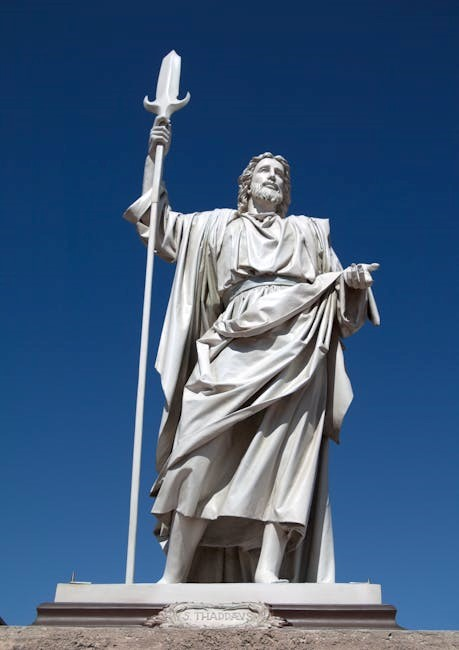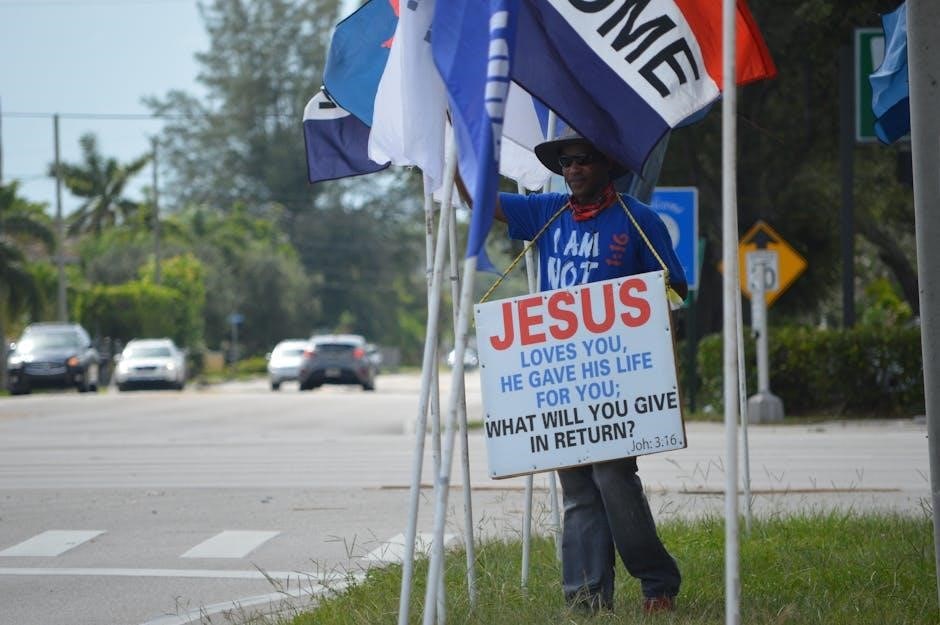Exploring the fusion of Christianity and rugged masculinity, Jesus and John Wayne reveals how white evangelicals redefined faith, blending it with American nationalism and cultural identity․
Overview of the Book and Its Significance
Jesus and John Wayne by Kristin Kobes Du Mez examines the blending of Christian faith with American masculinity and nationalism․ The book traces how white evangelicals redefined Jesus as a symbol of rugged, masculine power, mirroring figures like John Wayne․ Du Mez argues this transformation reflects broader cultural shifts, linking evangelical identity to ideals of strength, dominance, and patriotism․ The book critiques how this reimagined faith has shaped political alliances and fractured the nation, offering a compelling analysis of religion’s role in modern America․ Its significance lies in its thought-provoking exploration of how evangelicalism has evolved into a cultural and political force․

The Concept of Rugged Masculinity in Christianity

Jesus and John Wayne explores how white evangelicals redefined Christianity, merging it with American masculinity and nationalism․ The book examines the cultural shift where Jesus was reimagined as a “spiritual badass,” embodying traits like strength and dominance, similar to John Wayne․ This transformation reflects broader societal changes, linking evangelical identity to ideals of rugged individualism and patriotism․ The book critiques how this redefined faith has influenced political alliances and contributed to national division․ Its significance lies in its analysis of how evangelicalism has evolved into a powerful cultural and political force, shaping modern America’s religious and social landscape․
John Wayne as a Symbol of American Masculinity
John Wayne embodies the quintessential American ideals of rugged individualism, strength, and patriotism․ His on-screen persona, marked by confidence and a no-nonsense attitude, became a cultural symbol of masculinity․ Wayne’s characters often represented a morally steadfast, self-reliant man who upheld traditional values․ This image resonated deeply with white evangelicals, who drew parallels between his “tough, masculine” demeanor and their reimagined version of Jesus․ The book highlights how Wayne’s iconic status influenced evangelical identity, blending faith with nationalist ideals․ His legacy, as a cultural icon, underscores the fusion of religion, masculinity, and American identity explored in Jesus and John Wayne․
How White Evangelicals Redefined Jesus in the Image of John Wayne
White evangelicals reimagined Jesus as a figure embodying rugged masculinity, mirroring John Wayne’s on-screen persona․ This transformation aligned Jesus with ideals of strength, authority, and nationalism․ The book explores how this shift redefined faith, blending Christian teachings with American identity․ By portraying Jesus as a “spiritual badass,” evangelicals created a figure who resonated with cultural values of power and dominance․ This redefinition not only influenced religious practices but also shaped political alignments, fostering support for leaders like Donald Trump․ The convergence of faith and masculinity highlights a significant cultural and theological shift within evangelical communities, as detailed in Jesus and John Wayne․

The Cultural and Political Impact of Evangelicalism
Evangelicalism profoundly shaped American culture and politics, blending faith with nationalism and influencing leadership support, as seen in the rise of figures like Donald Trump․
The Role of Evangelical Christianity in Shaping American Politics
Evangelical Christianity has deeply influenced American politics, particularly through the rise of the Religious Right․ This movement, rooted in white evangelicalism, aligned faith with conservative values and nationalism․ Evangelical leaders and voters have consistently supported politicians who embody these ideals, such as Donald Trump․ The book Jesus and John Wayne highlights how this alignment redefined faith, prioritizing strength and patriotism over traditional teachings․ The 2016 election, where 81% of white evangelicals supported Trump, exemplifies this shift․ Evangelicalism’s political impact has shaped policies, cultural debates, and national identity, reflecting a fusion of religious and political agendas that continues to resonate in modern America․
The Intersection of Religion and Nationalism in Modern America
The fusion of evangelical Christianity with American nationalism has created a powerful cultural and political force․ This intersection, as explored in Jesus and John Wayne, often blurs the lines between religious identity and patriotic duty․ Many evangelicals embrace a vision of America as a divinely ordained nation, tying their faith to ideals of strength, freedom, and dominance․ This mindset has been reinforced by political leaders who align themselves with evangelical values, fostering a sense of shared mission․ The result is a worldview where national pride and religious devotion are deeply intertwined, shaping attitudes toward issues like immigration, militarism, and social justice․

Kristin Kobes Du Mez and Her Historical Perspective
Kristin Kobes Du Mez, a historian at Calvin University, examines the cultural and political evolution of evangelicalism, tracing its intersection with American identity and power structures․
The Author’s Background and Expertise in Religious History
Kristin Kobes Du Mez, a historian at Calvin University, specializes in the intersection of religion, gender, and culture․ Her academic journey began with studies on Christian feminism and the role of women in religious movements․ Influenced by mentors like Gail Bederman, she developed a keen eye for how gender and power shape religious narratives․ Du Mez’s early research focused on Teddy Roosevelt and masculinity, which later shifted to evangelicalism and its cultural influence․ Her work on Jesus and John Wayne stems from her fascination with how evangelical ideals of masculinity intertwined with political and national identity, particularly during the Trump era․
Key Arguments in “Jesus and John Wayne”
Kristin Kobes Du Mez argues that white evangelicals have redefined Christianity by blending it with rugged masculinity and Christian nationalism․ She traces how the traditional Jesus of the Gospels was replaced with a figure embodying strength, authority, and patriotism, resembling John Wayne․ This transformation, she contends, was driven by cultural and political shifts, particularly in the late 20th century․ Du Mez highlights how this ideology justified militarism, authoritarianism, and racial divides, culminating in support for leaders like Donald Trump․ Her analysis exposes how this redefinition of faith has fractured both the church and the nation, challenging the compatibility of such values with the teachings of Jesus․

Historical Context of Evangelical Movements
The book explores the historical roots of evangelical movements, tracing their evolution from the mid-20th century through the rise of the Religious Right and modern politics․
The Rise of the Religious Right in the 20th Century
The Religious Right emerged in the mid-20th century, gaining momentum in the 1970s and 1980s․ Evangelicals, concerned over cultural shifts like abortion and prayer in schools, mobilized politically․ Leaders such as Jerry Falwell founded organizations like the Moral Majority, uniting conservatives and influencing Republican politics․ This movement reshaped evangelical identity, blending faith with nationalism and paving the way for future political alignments․
Evangelical Support for Political Leaders Like Donald Trump
The evangelical embrace of Donald Trump, despite his controversial behavior, reflects a deeper cultural and theological shift․ Kristin Kobes Du Mez argues that white evangelicals prioritized power and cultural dominance over traditional moral values․ Trump’s persona, embodying rugged masculinity and nationalism, resonated with a redefined evangelical identity․ This support was not an anomaly but a culmination of decades of ideological alignment with conservative politics․ The book highlights how evangelicals’ focus on “spiritual badassery” and Christian nationalism led them to rally behind leaders who promised to restore America’s perceived greatness, even if it meant compromising on ethical standards they once held sacred․

The Theological Implications of “Christian Nationalism”
Christian nationalism merges faith with national identity, reinterpreting Jesus’ teachings to emphasize power and dominance, often at the expense of humility and compassion, creating theological and ethical tension․
How Evangelicals Have Reinterpreted Biblical Teachings
Evangelicals have reinterpreted biblical teachings to align with ideals of rugged masculinity and nationalism, often emphasizing strength, dominance, and patriotism over humility and compassion․ This shift reflects a cultural and political alignment, where figures like John Wayne symbolize a “warrior” Jesus, embodying power and control․ Such reinterpretations have led to a theology that prioritizes national prosperity and military might, diverging from traditional Christian emphasis on love and forgiveness․ This redefined faith has fostered a sense of divine destiny for America, influencing political engagement and support for leaders like Donald Trump, creating tension between biblical teachings and modern evangelical values․

The Tension Between Jesus’ Teachings and Modern Evangelical Values
The teachings of Jesus, emphasizing humility, compassion, and love, stand in stark contrast to the modern evangelical values shaped by rugged masculinity and nationalism․ While Jesus preached about caring for the marginalized and turning the other cheek, many evangelicals today prioritize strength, dominance, and patriotic ideals․ This tension is evident in the reinterpretation of Jesus as a “warrior” figure, aligning with cultural heroes like John Wayne․ Such a shift has led to widespread support for political leaders who embody these values, even when their actions contradict traditional Christian ethics․ This divergence reflects a growing gap between biblical principles and contemporary evangelical practices․

The Role of Media and Pop Culture
Media and pop culture significantly shaped evangelical perceptions, blending Jesus’ teachings with John Wayne’s rugged individualism, deeply influencing modern evangelical identity and values․
How John Wayne’s Image Influenced Evangelical Identity
John Wayne’s rugged, masculine persona deeply resonated with white evangelicals, reshaping their perception of Jesus․ His depiction of strength and authority aligned with ideals of Christian nationalism, merging faith with American identity․ Evangelicals embraced this blend, creating a cultural narrative where Jesus was reimagined as a “spiritual badass․” Wayne’s influence extended beyond cinema, seeping into religious discourse and political alignment․ His image symbolized a fusion of faith, patriotism, and power, becoming a cornerstone of evangelical identity and shaping their support for leaders embodying similar traits, such as Donald Trump․
The Power of Media in Shaping Religious Narratives
Media has played a pivotal role in shaping religious narratives, particularly in the context of evangelical Christianity․ Through films, books, and public figures, cultural ideals of masculinity and nationalism have been woven into religious identity․ John Wayne’s on-screen persona, embodying toughness and independence, influenced how evangelicals perceived Jesus, reframing Him as a symbol of strength and authority․ This cultural fusion illustrates how media can redefine sacred figures, blending entertainment with theology․ The widespread consumption of such narratives highlights the profound impact of pop culture on religious beliefs, creating a unique interplay between faith and American identity․
Evangelicalism faces evolving challenges, calling for self-reflection and adaptation․ As societal values shift, the movement must reconcile its traditions with modernity, potentially embracing reform to foster unity and relevance․
Challenges to Traditional Evangelical Ideals
Traditional evangelical ideals are increasingly scrutinized as cultural shifts and internal critiques highlight contradictions between modern values and historical doctrines․ Issues like racial inequality, gender roles, and political entanglement spark debates․ The association of faith with nationalism and masculinity, as explored in Jesus and John Wayne, faces pushback from younger, more diverse voices seeking inclusivity and social justice․ These challenges threaten the cohesion of evangelical identity, prompting some to question whether the movement can adapt without losing its core principles․ The future hinges on how evangelicals navigate these tensions while remaining relevant in a rapidly changing world․
The Potential for Reconciliation and Reform
Amidst growing divides, there is hope for reconciliation within evangelicalism․ Calls for a return to Jesus’ teachings on love and humility resonate, offering a path away from cultural warfare․ Reform efforts focus on dismantling toxic masculinity and nationalism, fostering inclusivity․ Younger generations and diverse voices within the church push for accountability and ethical integrity․ While challenges remain, the potential for renewal lies in embracing a faith centered on compassion and justice․ This shift could bridge gaps within the evangelical community and beyond, revitalizing its witness in a fractured world․